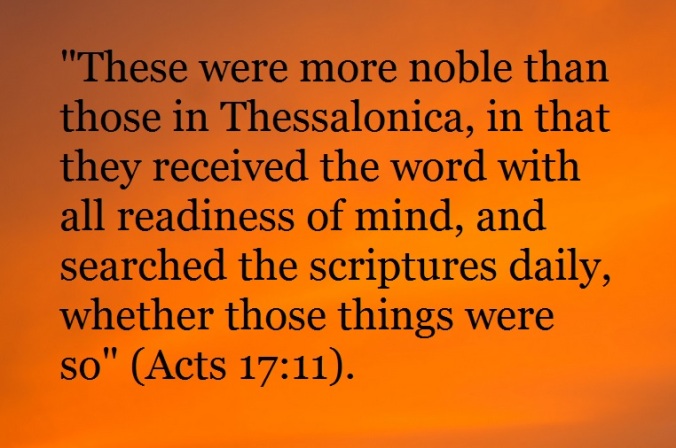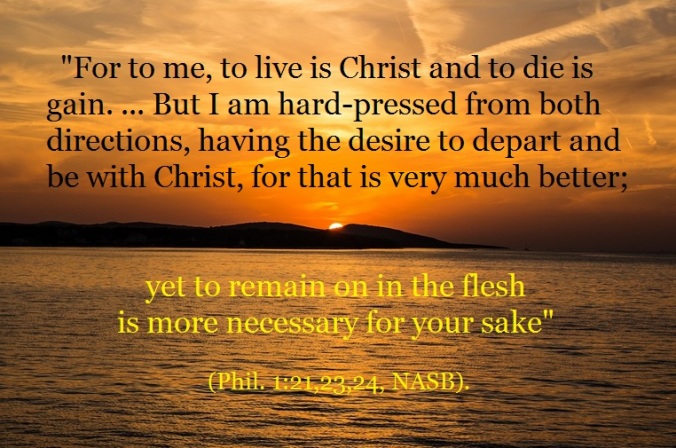“Go therefore and make disciples of all the nations…teaching them to observe all that I commanded you; and lo, I am with you always, even to the end of the age” (Matthew 28:19-20, NASB).
——————–
Contents:
1) Remembering the Past (David Watson)
2) Futile Figuring (Dan Shipley)
——————–

-1-
Remembering the Past
David Watson
The past can be a painful reminder. Everyone has moments in their past that they regret and wish could be forgotten. Bad decisions, relationships, and mistakes pour bitter memories on our hearts and sometimes leave us with festering wounds that take years, or even a lifetime, to heal. It is these memories and feelings that, for the average person, force us to spend the rest of our lives trying to avoid the memory of these mistakes.
Yet on a more positive side of things, there are memories that bring us just as much joy as the bad memories bring us pain. When we think back on these moments we can’t help but smile, and feelings of refreshment — whether they be thankfulness, warmth, comfort, or the like — fill our hearts again, leaving us full and revived.
In spite of the agonizing memory of our spiritual mistakes or the revitalizing nature of our sweetest spiritual moments, there often comes a point in our Christian walk in which we become somewhat comfortable, maybe even passive, in our relationship with Christ. Over time, we become used to the message of the cross and comfortable with its call and conditions. This is not far from what the church at Ephesus was experiencing. Though written after the book of Ephesians, Revelation says this concerning the Ephesian church: “…I have this against you, that you have left your first love. Remember therefore from where you have fallen; repent and do the first works, or else I will come to you quickly and remove your lampstand from its place – unless you repent” (Revelation 2:4-5). A similar appeal is seen by Paul in his letter to the Ephesians when he says, “Therefore, remember that you, once Gentiles in the flesh, were without Christ… having no hope and without God in the world (Eph. 2:11-13).
What is the value of remembering where we have come from? What is the value of ruminating on the past? Although at one time Paul did emphasize his efforts to forget his past of devout commitment to Judaism and the law (Phil. 3:13), both Paul and Jesus wanted the Ephesians to remember their past for a reason. Notice Paul’s appeal to the Ephesians. In the midst of an effort to motivate these brethren to “walk worthy of the calling” (Eph. 4:1), Paul feels it necessary to remind the Ephesians where they came from. Their past was nothing short of despair, illustrated by Paul’s identification of them as “dead in their trespasses and sins” (Eph. 2:1) and “by nature children of wrath, just as the others” (2:3). This alone didn’t serve as a sufficient reminder, seeing as how Paul continues to remind them that they were “without Christ” and had “no hope” and were “without God in the world” (Eph. 2:12) prior to their obedience to Him.
Why would such bitter memories and descriptions of their past be beneficial to the Ephesians in their current state? Though some would consider this to be counterintuitive, there is wisdom found here. Consider yourself for a moment – as suggested earlier, have you ever felt comfortable, or passive, in your walk with Christ? Have you felt as if your drive to obey was weak and your motivation to please Him was lacking or even nonexistent? Forgetting where we came from in our relationship with Christ is as harmful as not calling to mind everything our parents or mentors did for us in our childhood/formidable years. To forget our weakness without them is to forget the blessing of having them. When we call to mind where we once were without Christ — dead, without hope, and without God — there is a sobriety that ought to overwhelm us. A sobriety brought on by the remembrance of our horrible and sinful past. Yet this does not leave us empty handed. As was the case with the Ephesians, these same memories ultimately lead us to a remembrance of the warmth, comfort and thankfulness we ought to feel in Christ.
While observing Paul’s appeal to remember our sins in Ephesians 2 is beneficial for rededication to Christ, Christ’s appeal in Revelation 2:4-5 adds an element to our rededication to Him. “Remember therefore from where you have fallen; repent and do the first works…” (Rev. 2:5). Though our passivity toward Christ can come from a lack of remembrance of our sinful and desperate state, there is a degree to which when we forget “our first love,” we become lukewarm. Just as a remembrance of the sweetest moments of our lives overwhelms us with feelings of happiness, so ought our remembrance of His love do the same. Simply remembering our sinful past does nothing more for us than bring back painful memories, but when coupled with the love of Christ, it can motivate us to “walk worthy” again. After Paul brought back their memories of their former state, he reminded the Ephesians of what God did for them in spite of it: “even when we were dead in trespasses, [He] made us alive together with Christ (by grace you have been saved), and raised us up together, and made us sit together in the heavenly places in Christ Jesus” (Eph. 2:5-6). Often when we feel passive about Christ, we have forgotten who He is – our first love! When we call to mind what our first love has done for us in spite of our sins, we ought to be motivated to repentance and rededication to Him —“remember therefore from where you have fallen; repent and do the first works.”
Yes, remembering our past can be a painful thing. But with Christ, it can be something beautiful and healing. Take the time to remember where you came from, and if need be, from where you have fallen. If these memories touch you, then repentance will follow, and all that will be left is a rededication to your first love.
— Via articles from the Eastside church of Christ, Athens, Alabama
——————–

-2-
Futile Figuring
Dan Shipley
“Then came Peter and said to him, Lord, how oft shall my brother sin against me, and I forgive him? until seven times? Jesus saith unto him, I say not unto thee, Until seven times; but, Until seventy times seven” (Matt. 18:21, 22).
There are times when it is best to forget the arithmetic. One such time, as Jesus implies here, is when it involves extending forgiveness. Since God will not forgive the unforgiving (Matt. 6:14,15), any limitations imposed on man’s showing mercy would also limit his receiving it. The parable introduced by Peter’s question makes this very point. Like the unmerciful servant, every Christian has received infinitely more than he could ever pay out in the coin of forgiveness. Why, then, this business of score keeping? Why taint mercy with a spirit of reluctance? Where mercy is needed, counting is criminal. The important thing is not “how many,” but to forgive from a truly merciful heart (Matt. 18:35).
Another time when “How many?” becomes a needless is when it is applied to the number who will be saved. An inquirer apparently had this in mind when asking Jesus, “Lord, are they few that are saved?” (Lk. 13:23). Without involving Himself in the arithmetic of the matter, Jesus shows at once where the concern should be: “Strive to enter…” The important thing is what about ME? — and whether I am striving to enter. The business of saving self (Acts 2:40) deserves priority because that’s where we can do most. Only with a striving ME can we help the few to be many. A similar, but equally fruitless, concern of some involves itself with how many will be in heaven (not the same, with them, as how many will be saved). They wrongly envision a whole host of saved dwelling in an earthly kingdom, but only 144,000 making up the “little flock” of priests and kings in heaven. Again, the important thing is my striving, but for what? — certainly not a glorified earth-bound existence! The only eternal abode of the saved is in heaven. That is where the inheritance of the righteous is reserved (1 Pet. 1:4); that is where our hope is laid up (Col. 1:5); and that is where Jesus has gone (1 Pet. 3:22) to prepare a place in which the redeemed can be with Him (Jn. 14:2,3). Its inhabitants are not limited by a fixed decree of God, but only by a striving by faith to do His will from the heart (Matt. 7:21).
Yet another area of futile figuring concerns the time of Christ’s return. Some have been so bold as to set specific dates, the coming of which did not bring Christ, but only frustration and disappointment. Yet, in spite of such failures, “wiser” ones keep on figuring and letting us in on what the Lord said no man or angel could know (Matt. 24:36). The important thing is that He is coming, not when! What difference should that make to the faithful? Admittedly, our time IS short! — not because we know Christ is coming soon, but because we will be leaving soon! But for now, God’s longsuffering continues. The time is too short for idle pursuits and hindering speculations. We must look carefully to how we live — and be wise, redeeming the time.
— Via Plain Talk, February 1980, Vol. XVI, No. XII, Pg. 3
——————–
The Steps That Lead to Eternal Salvation
1) Hear the gospel, for that is how faith comes (Rom. 10:17; John 20:30,31).
2) Believe in the deity of Christ (John 8:24; John 3:18).
3) Repent of sins (Luke 13:5; Acts 17:30).
4) Confess faith in Christ (Rom. 10:9,10; Acts 8:36-38).
5) Be baptized in water for the remission of sins (Mark 16:16; Acts 2:38; 22:16; Rom. 6:3,4; Gal. 3:26,27; 1 Pet. 3:21).
6) Continue in the faith, living for the Lord; for, if not, salvation can be lost (Heb. 10:36-39; Rev. 2:10; 2 Pet. 2:20-22).
——————–
Tebeau Street
CHURCH OF CHRIST
1402 Tebeau Street, Waycross, GA 31501
Sunday services: 9:00 AM (Bible class); 10 AM & 5 PM (worship)
Wednesday: 7 PM (Bible class)
evangelist/editor: Tom Edwards (912) 281-9917
Tom@ThomasTEdwards.com
http://thomastedwards.com/go (Older version of Gospel Observer website without pictures, but back to March 1990)
http://tebeaustreetchurchofchrist.org/
http://ThomasTEdwards.com/audioser.html (audio sermons)



















